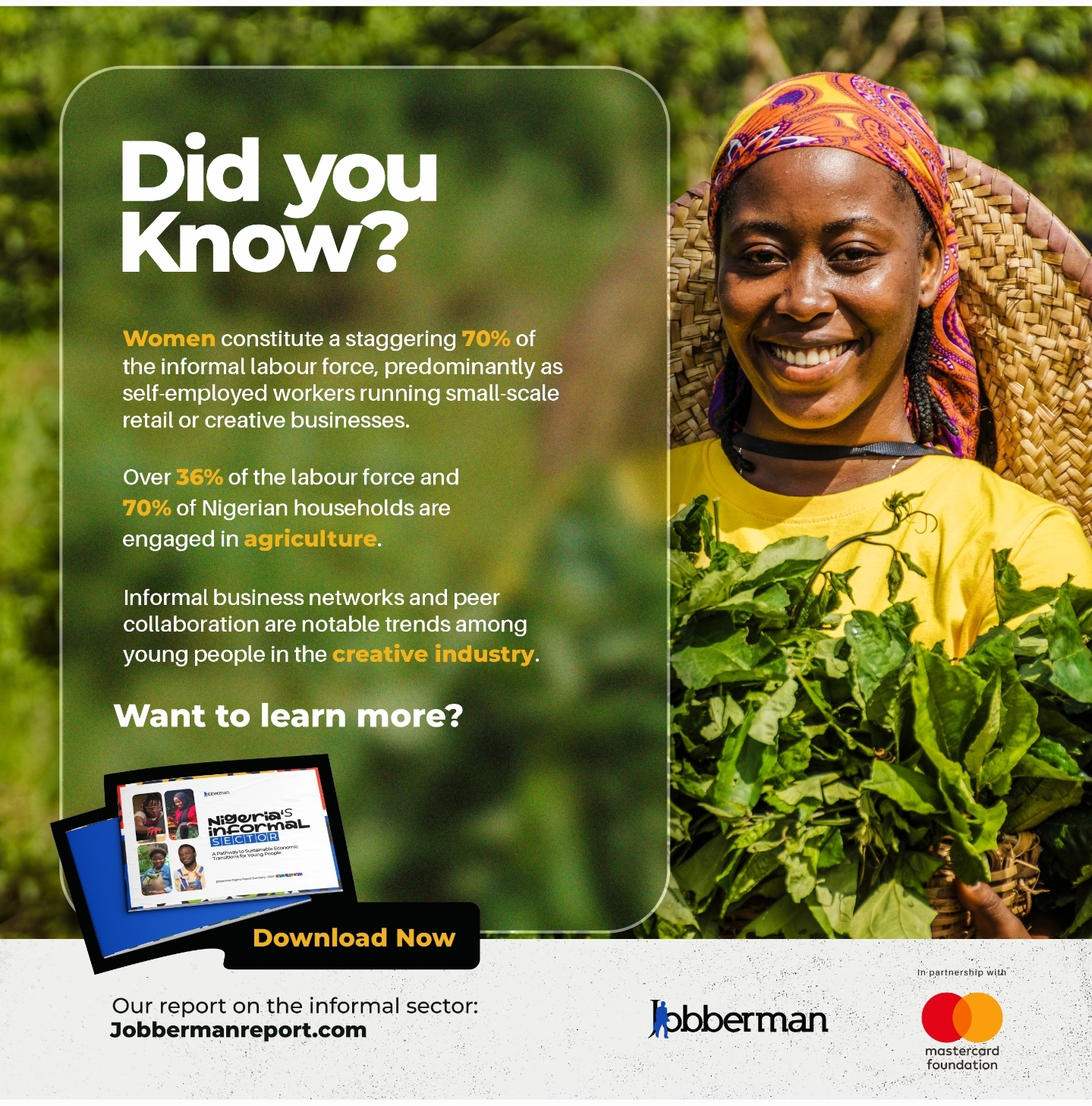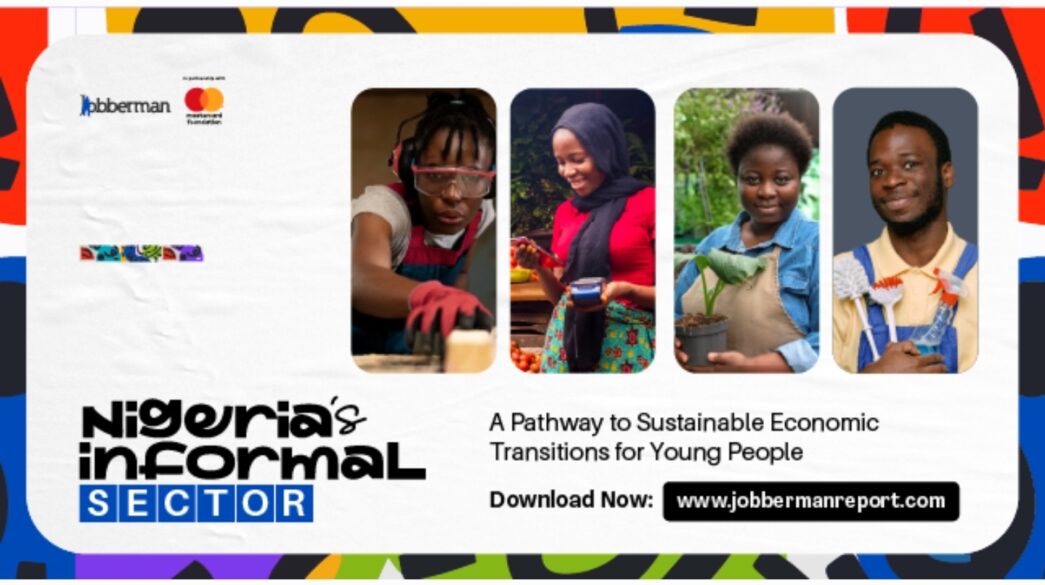New Report Uncovers Critical Insights into the Hidden Engine of Nigeria’s Economy A groundbreaking report released by Jobberman Nigeria, in partnership with the Mastercard Foundation, has revealed the crucial role of the informal sector in driving Nigeria’s economic growth and employment. This comprehensive study provides unprecedented insights into a segment that forms the backbone of the nation’s workforce, accounting for a significant portion of the country’s GDP. The study unveils several key findings that highlight the sector’s significance. The informal sector dominates employment trends, with 76.7% of employed Nigerians engaging in informal work for, at least, one hour weekly. Self-employment leads the charge at 75.4%, underscoring the entrepreneurial spirit of Nigerians. The sector serves as a vital economic lifeline for youth, women, and vulnerable populations, providing jobs in Nigeria and survival pathways for millions.  However, the report also identifies significant challenges. A notable skills gap, particularly in digital tools and business development, is hindering the growth potential of informal businesses. Regional disparities between Northern and Southern Nigeria in terms of skills rewards, talent retention, and access to training opportunities are evident. The rise of digital platforms is reshaping the sector, presenting both opportunities and regulatory challenges. Glory Aiyegbeni, lead researcher for the study, stated, “This report unveils the informal sector as Nigeria’s hidden economic powerhouse. It’s not just about survival – it’s a hotbed of innovation and entrepreneurship. However, transitioning these businesses to sustainable models remains a significant challenge. We’ve found that many workers are trapped in survivalist businesses, unable to transition into sustainable enterprises and dignified work due to poor business environments and market conditions.” The report highlights the impact of digitisation on the informal sector. It notes that the digital revolution has disrupted traditional informal work patterns, facilitating the formal aggregation of informal workers and democratising upskilling platforms. This shift has necessitated the need for advanced, inclusive, and comprehensive work policies to address new forms of work such as freelancing and gig work. Oreoluwa Boboye, CEO of Jobberman Nigeria, adds, “Our findings provide a clear roadmap for harnessing the immense potential of Nigeria’s informal sector. By addressing the identified challenges, we can drive sustainable growth and create dignified employment for millions. It’s crucial that we recognise and optimise traditional employment and apprenticeship models, such as the Igbo Apprenticeship Model, which has been recognised as one of the largest business incubators in the world.” The report recommends several interventions to address the sector’s challenges. These include implementing multi-channel training programs to bridge skills gaps, particularly in soft skills, financial literacy, and small business management. Building marketplaces for fragmented verticals and optimising local associations to better serve young entrepreneurs are also key recommendations. Additionally, developing context-sensitive policies for informal workers and businesses, as well as recognising and enhancing traditional employment and apprenticeship models, are crucial steps forward. The study also emphasises the need for policies that balance formalization efforts with the unique dynamics of the informal sector. It suggests that rather than imposing formal structures, policies should aim to optimise existing informal practices while providing better protection and benefits for informal sector workers. This comprehensive report is set to inform policy makers, business leaders, and stakeholders about the critical role of the informal sector in Nigeria’s economy and the interventions needed to support its growth and transition towards more dignified and fulfilling work opportunities. Download the full report at https://www.jobbermanreport.com/.
However, the report also identifies significant challenges. A notable skills gap, particularly in digital tools and business development, is hindering the growth potential of informal businesses. Regional disparities between Northern and Southern Nigeria in terms of skills rewards, talent retention, and access to training opportunities are evident. The rise of digital platforms is reshaping the sector, presenting both opportunities and regulatory challenges. Glory Aiyegbeni, lead researcher for the study, stated, “This report unveils the informal sector as Nigeria’s hidden economic powerhouse. It’s not just about survival – it’s a hotbed of innovation and entrepreneurship. However, transitioning these businesses to sustainable models remains a significant challenge. We’ve found that many workers are trapped in survivalist businesses, unable to transition into sustainable enterprises and dignified work due to poor business environments and market conditions.” The report highlights the impact of digitisation on the informal sector. It notes that the digital revolution has disrupted traditional informal work patterns, facilitating the formal aggregation of informal workers and democratising upskilling platforms. This shift has necessitated the need for advanced, inclusive, and comprehensive work policies to address new forms of work such as freelancing and gig work. Oreoluwa Boboye, CEO of Jobberman Nigeria, adds, “Our findings provide a clear roadmap for harnessing the immense potential of Nigeria’s informal sector. By addressing the identified challenges, we can drive sustainable growth and create dignified employment for millions. It’s crucial that we recognise and optimise traditional employment and apprenticeship models, such as the Igbo Apprenticeship Model, which has been recognised as one of the largest business incubators in the world.” The report recommends several interventions to address the sector’s challenges. These include implementing multi-channel training programs to bridge skills gaps, particularly in soft skills, financial literacy, and small business management. Building marketplaces for fragmented verticals and optimising local associations to better serve young entrepreneurs are also key recommendations. Additionally, developing context-sensitive policies for informal workers and businesses, as well as recognising and enhancing traditional employment and apprenticeship models, are crucial steps forward. The study also emphasises the need for policies that balance formalization efforts with the unique dynamics of the informal sector. It suggests that rather than imposing formal structures, policies should aim to optimise existing informal practices while providing better protection and benefits for informal sector workers. This comprehensive report is set to inform policy makers, business leaders, and stakeholders about the critical role of the informal sector in Nigeria’s economy and the interventions needed to support its growth and transition towards more dignified and fulfilling work opportunities. Download the full report at https://www.jobbermanreport.com/.
Advertisement













